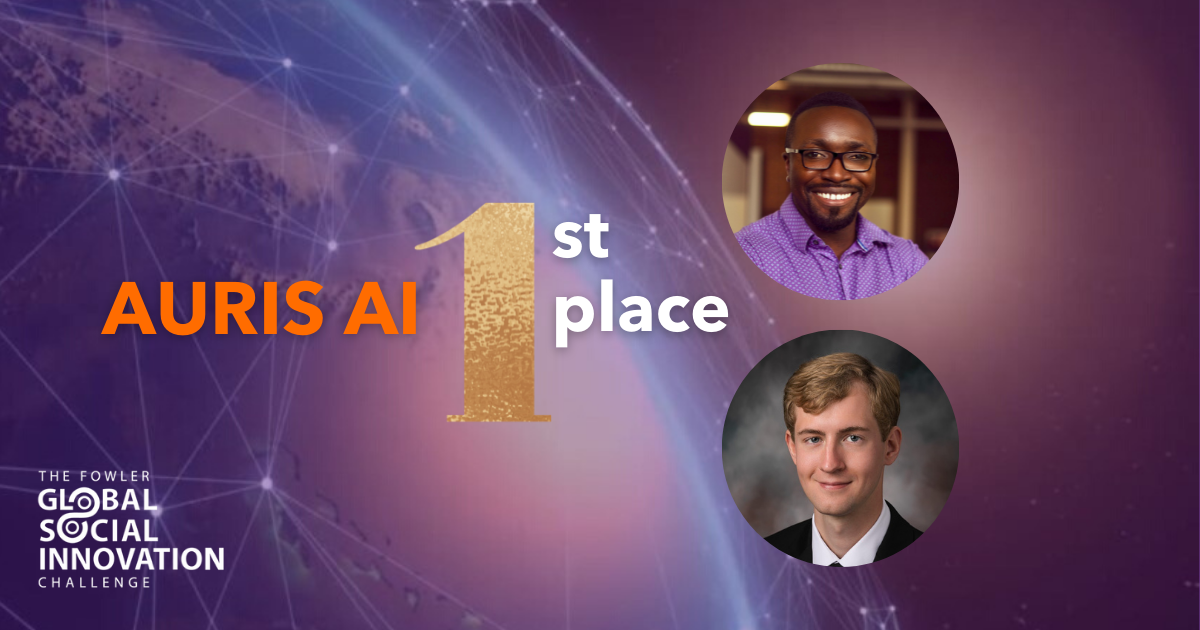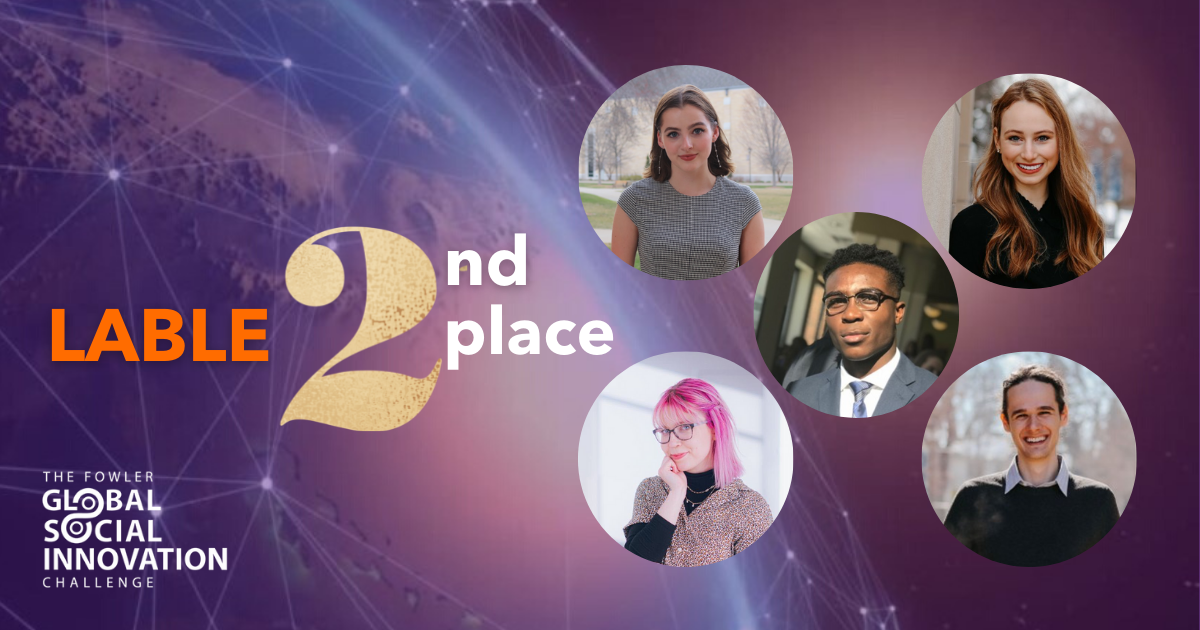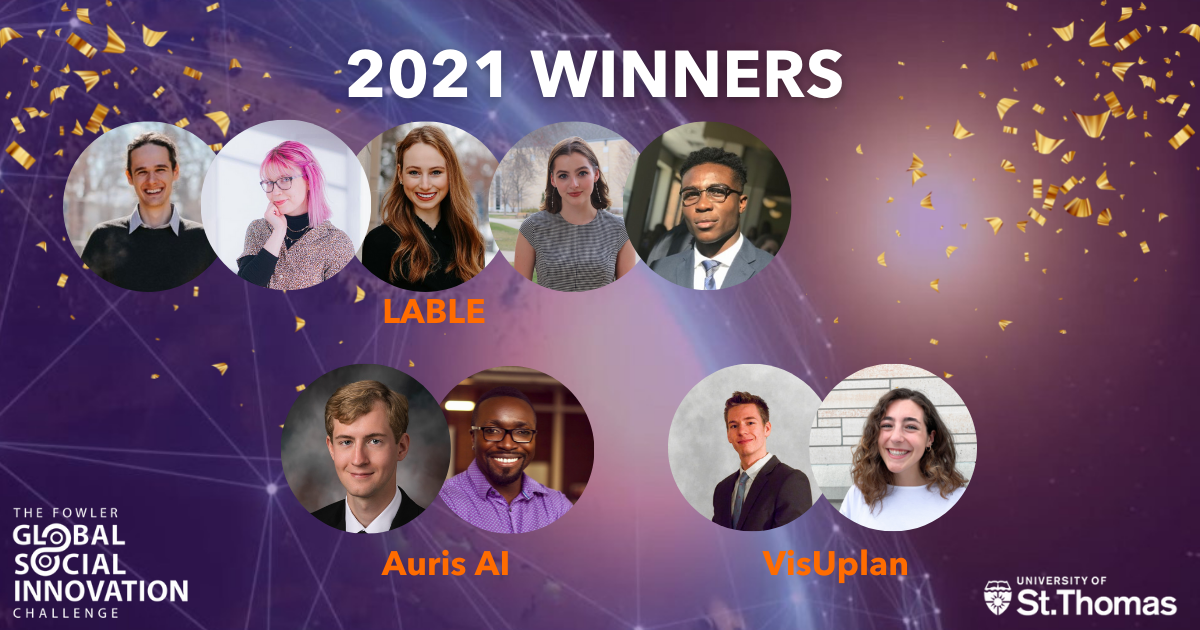Seven St. Thomas students, representing two teams, are advancing to the Fowler Global Social Innovation Challenge (Fowler GSIC) Global Finals after successfully competing in the second annual Fowler GSIC held at St. Thomas in April. To compete in Fowler GSIC, student teams identify a social or environmental problem of their choice then propose an innovative solution to their chosen problem. The two top St. Thomas teams, Auris AI and LABLE, both sought to empower individuals – clinicians and people living with disabilities, respectively. There were six teams in all, with 16 students representing 15 majors across the university.
Each team in the multi-round competition engaged with one or more of the United Nations 17 Sustainable Development Goals, ranging from ending hunger by promoting sustainable agriculture to achieving gender equality, building resilient infrastructure, combating climate change, and providing access to justice for all.
“We celebrate the social entrepreneurs among us, those students who are tackling important societal challenges and working to make the world a better place through innovation and entrepreneurship,” said Laura Dunham, associate dean of the Schulze School of Entrepreneurship. “In a world of challenges, our students are not afraid to say, ‘There has to be a better way.’”
To support the six teams and all student participants, the Schulze School of Entrepreneurship hosted several workshops and mentoring sessions. Nineteen mentors, online judges and finalist judges volunteered their time to make this competition possible.
The teams competing in the St. Thomas finals took home a total of $10,500 in cash prizes. At the Global Finals, Auris AI and LABLE will represent the university and have a chance to win up to $60,000 in seed capital prizes.
The Global Finals, taking place on June 12, expects participants from 28 universities and 16 countries. It will be hosted virtually by St. Thomas, which alternates hosting annually with the University of San Diego.
Here’s a look at the top three winners from St. Thomas.

Auris AI ($5,000 winner)
Auris AI’s intelligent stethoscope empowers clinicians by bringing the tools and expertise of the most knowledgeable cardiologists to their stethoscopes. The technology eliminates unnecessary testing and shortens the time to treatment. With Auris AI, clinicians can save more lives, while hospitals and clinics can help make quality health care diagnostics more accessible. Team members: Ebenezer Dadson ’20, ’21 MS (electrical and computer engineering) and John Wallace ’20 (electrical and electronics engineering).
“We’re so excited to be moving forward,” Wallace said. “We would like to thank the judges and mentors; St. Thomas and the Schulze School of Entrepreneurship; and Ron and Alexis Fowler for sponsoring the competition. We look forward to the next stage of the competition and to continue building our venture this summer.”

LABLE ($3,000 winner; $500 for audience choice)
LABLE is an interactive e-commerce platform that enables people living with disabilities to easily find accessible clothing without compromising their individuality. The platform leverages existing small adaptive brands and designers, providing them with one centralized site to sell their designs. With the disconnect between designers and customers being the biggest cause of the clothing inequalities the disabled population faces, LABLE bridges this gap by providing an inclusive and sustainable solution. Team members: Amy Helgeson (junior, entrepreneurship and marketing); Tim Mafe (sophomore, finance); Katie McDonald (freshman, entrepreneurship); Luca Arcuria (junior, business leadership and management); Sarah Chock (junior, actuarial science and statistics).
VisUplan ($2,000 third-place runner-up)
A visual planning and anxiety-relieving app for people with autism won $2,000 for third place. Team members: Rachel Farah (senior, computer engineering) and Kevin Malmsten (senior, computer engineering).







